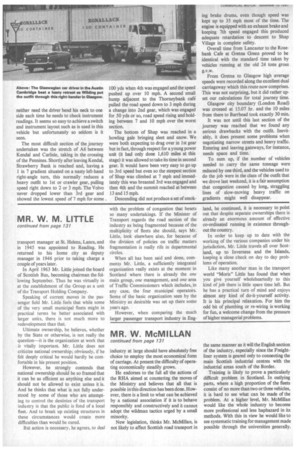MR. W. M. LITTLE
Page 136

If you've noticed an error in this article please click here to report it so we can fix it.
continued from page 131
transport manager at St. Helens, Lanes, and in 1945 was appointed to Reading. He returned to his home city as deputy manager in 1946 prior to taking charge a couple of years later.
In April 1963 Mr. Little joined the board of Scottish Bus, becoming chairman the following September. Thus he was virtually in at the establishment of the Group as a unit of the Transport Holding Company.
Speaking of current moves in the passenger field Mr. Little feels that while some of the very small municipal fleets might in practical terms be better associated with larger units, there is not much more to redevelopment than that.
Ultimate ownership, he believes, whether by the State or otherwise, is not really the question—it is the organization at work that is vitally important. Mr. Little does not criticize national ownership; obviously, if he felt deeply critical he would hardly be comfortable in his present position.
However, he strongly contends that national ownership should be so framed that it can be as efficient as anything else and it should not be allowed to exist unless it is. And he thinks that what is not fully understood by some of those who are attempting to control the destinies of the transport industry is that the public is fond of a local fleet.. And to break up existing structures in these circumstances would create more difficulties than would be cured.
But action is necessary, he agrees, to deal with the problem of congestion that besets so many undertakings. If the Minister of Transport regards the road section of the industry as being fragmented because of the multiplicity of fleets she should, says Mr. Little, look elsewhere also, for because of the division of policies on traffic matters fragmentation is really rife in departmental circles.
When all has been said and done, comments Mr. Little, a sufficiently integrated organization really exists at the moment in Scotland where there is already the one main group, one management, and one area of Traffic Commissioners which includes, in any case, the four municipal operators. Some of the basic organization seen by the Ministry as desirable was set up there some years ago.
However, when comparing the much larger passenger transport industry in Eng land, he continued, it is necessary to point out that despite separate ownerships there is already an enormous amount of effective co-ordinated running in existence throughout the country.
In order to keep up to date with the working of the various companies under his jurisdiction, Mr. Little travels all over Scotland, up to Inverness and the Islands, keeping a close check on day to day problems of operation.
Like many another man in the transport world "Moris" Little has found that when you give yourself wholeheartedly to this kind of job there is little spare time left. But he has a practical turn of mind and enjoys almost any kind of do-it-yourself activity. It is his principal relaxation. For him the odd bit of plumbing or re-wiring is working for fun, a welcome change from the pressure of higher managerial problems.




































































































































































































































































